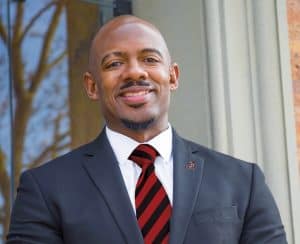Riley speaks out after six months of silence

Photo courtesy of UA News
March 5, 2020
Former assistant vice president of student life and dean of students Jamie Riley published an open letter today on Medium.com after six months of silence since his resignation.
Riley, who had just started working at the University in February of 2019, signed a separation agreement on Sept. 4. This was the same day a Breitbart News article criticized his tweets expressing his belief that the United States flag exists as a symbol of systemic racism for African American people.
Student groups, faculty and other members of the campus community rallied on his behalf and opened a dialogue about diversity issues, institutional racism and the limitations of their free speech. A Die-In, Work-In and a series of open letters persisted for months while Riley remained silent.
[Read more: A month after Riley’s resignation, demonstrations continue]
Riley’s article, titled “An Open Letter to Student Affairs: Student Affairs is not Safe for Black/African American People,” marks his first public statement since before his Sept. 5 resignation. He details the aftermath of the Breitbart article and his subsequent resignation but does not name the University of Alabama or any colleagues.
“In an instant, my life and safety were both threatened because I spoke 400 years (1619-2019) of truth and power into 140 typed characters on Twitter,” Riley wrote, noting that death threats ensued for months following its release.
He shared that in the midst of the chaos and confusion, he “mistakenly felt a sense of security” in the protection he anticipated from his higher ed colleagues. Instead, he claimed that he had to navigate the aftermath of the event without any formal support from the University.
“I came to one conclusion during this journey – student affairs, as a profession, is not safe for Black/African-American people,” Riley wrote. “It only becomes safe when we center our racial identity and personification of it within the comfort of white fragility.”
He pointed to his own perspective as a descendant of enslaved people and acknowledged the difficulty of understanding this experience for those who do not share this identity. Despite this challenge, Riley said he believes white administrators and faculty must consider the systemic racism present in their institutions, particularly within the realm of student affairs.
“I hope the contents of this letter evoke a greater conversation about the importance of fostering environments where Black/African-American student affairs professionals can authentically navigate majority-white spaces without the lingering fear of external retaliation – environments where using one’s voice strategically and boldly is celebrated and encouraged,” he wrote. “I also hope that if, at any time, fellow Black/African-American student affairs professionals are attacked for speaking their truth, the entirety of the profession will rally behind them in full support, using its collective power in a steadfast protest.”
Although Riley chose to walk away from the profession at this time and pursue endeavors in the nonprofit sector, he called for a “true road to inclusion” for black and African American people in the workplace.
The Crimson White has reached out to the University for comment and will update this story with any responses.




















